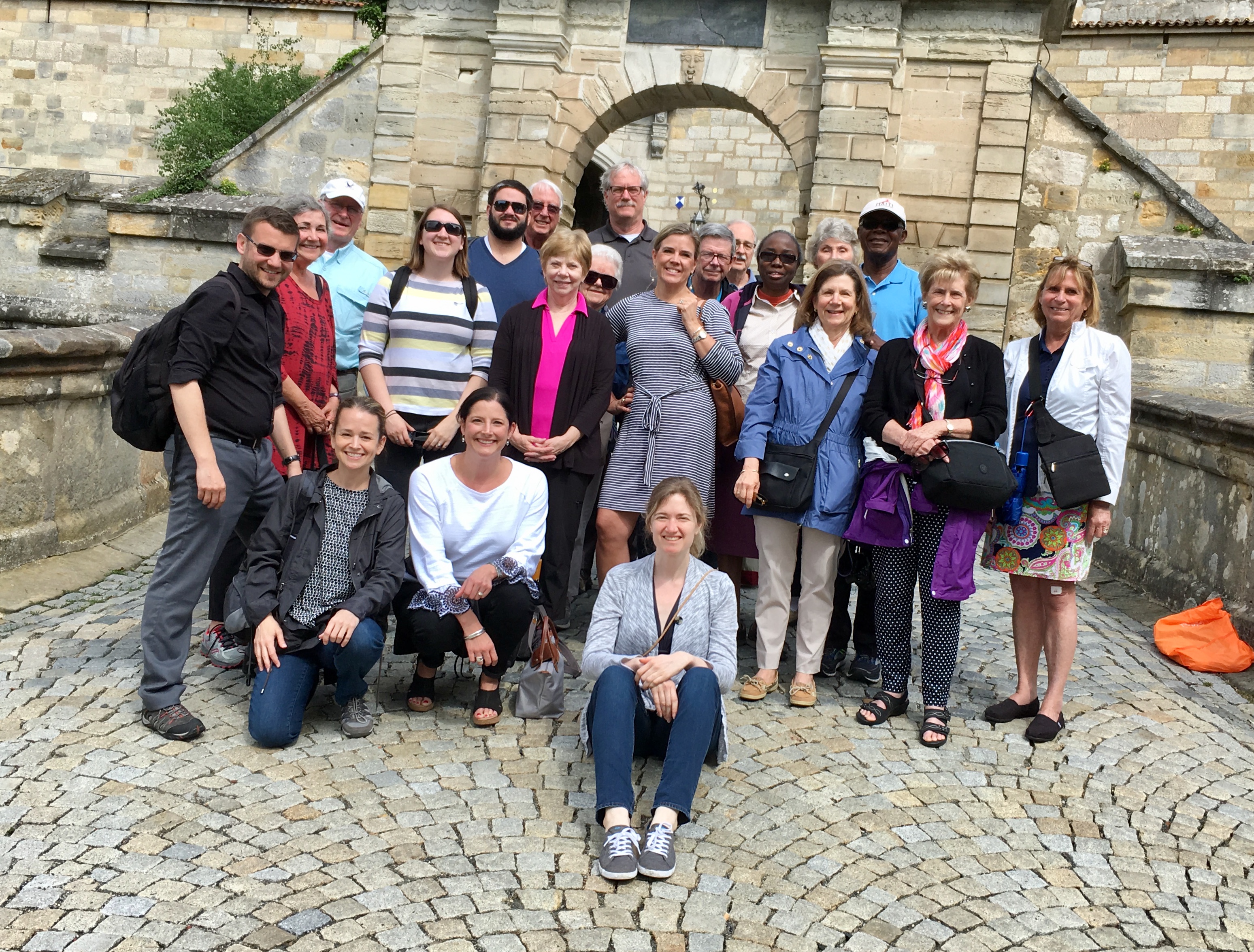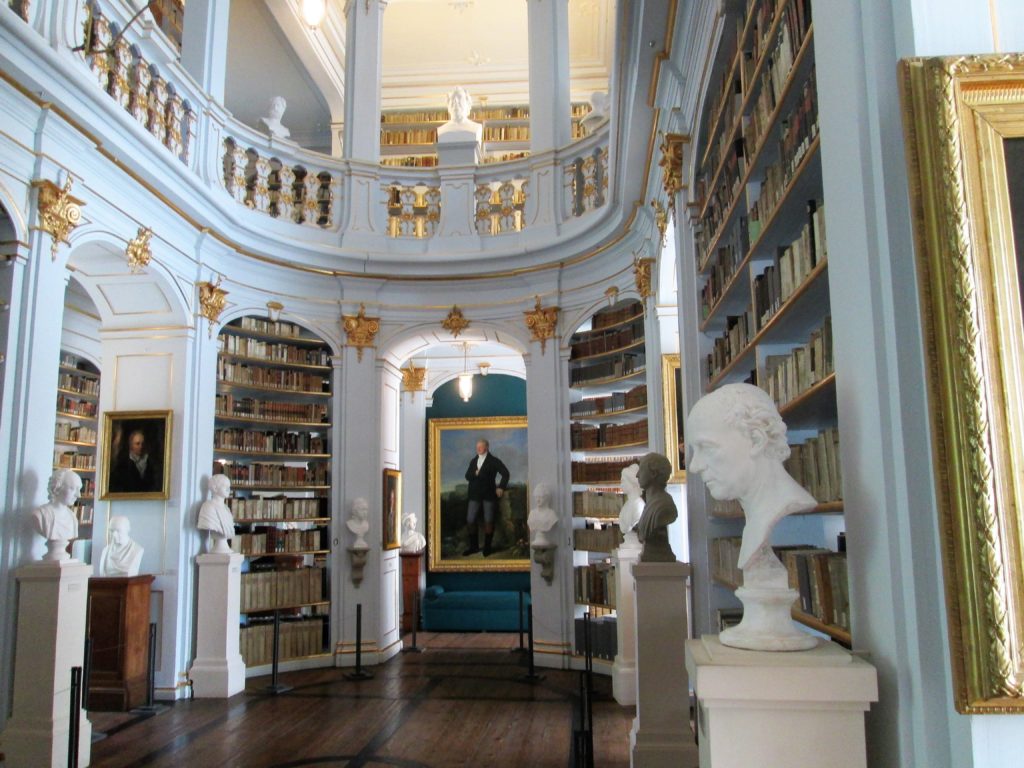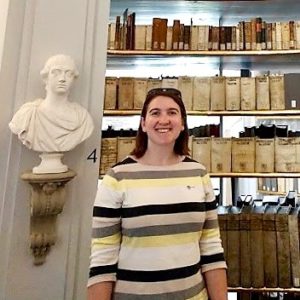Reformation Tour: Bridging the Divide

BY EMILY RHODES HUNTER
When I walked across the stage to receive my Master of Divinity degree from Union Presbyterian Seminary in 2015, I was relieved to know that I’d submitted the final writing assignment of my seminary career. No more papers or projects! No more deadlines! Freedom never sounded so sweet. Little did I know that three years later, I’d be joining Union’s Tour of the Reformation and Dr. Tricia Vesley would ask me to submit a blog post about our travels. “Once a student, always a student,” I sighed to my husband, Stuart. That being said, if life-long learning means traipsing around Europe for two weeks, I’d say it’s a pretty sweet gig, writing and all!
As we’ve followed in the footsteps of Luther, Zwingli, and Calvin, traveling through Germany, France, and Switzerland, I’ve found myself reflecting a great deal on my own theological education and preparation for ministry. These first few years of ministry have involved learning how to integrate what I’ve learned in textbooks and classrooms into the everyday work that I do as I seek to serve God’s people. As one might expect, it’s been quite the learning curve. Yet, learning how to build bridges between academic study and congregational ministry is an essential skill for every young pastor, even Luther himself.
Though Luther initially intended his writings for a purely academic audience, circulating his ideas for the sheer purpose of scholarly debate, he soon learned that for theology to be relevant, it has to leave the ivory tower. By nailing his 95 Theses on the doors of Castle Church in Wittenburg, he set in motion reforms that may not have occurred had his ideas never left the academy. As Luther’s theology developed further, his focus shifted from reforming clerical abuses (simony, nepotism, lavishness, etc.) to reforming church doctrines and practices. He advocated for the use of the vernacular language and for the laity to receive Communion in both kinds, which would have allowed the common person to participate more fully in religious life. He preached against the sale of indulgences and the church’s extravagance, advocating for money to be given to the poor rather than the pope. His teachings made a difference in the lived experience of everyday people, and his ideas quickly spread far beyond the university as their impact was felt throughout the church.
Yesterday, we visited the Coburg Fortress (top photo), where Luther translated the Hebrew Bible into the German vernacular. Afterward, we traveled to Weimar to marvel at Duchess Anna Amalia’s library, one of Germany’s first public libraries, which made over a million volumes, including extensive works by Goethe and Luther, accessible to a much wider audience.

Dutchess Anna Amalia’s library in Weimar, Germany (Emily Rhodes Hunter)
Just as libraries were once the private collections of the elite, so too was the Bible, in the Latin Vulgate, only accessible to the priests and scholars. The elites of Luther and Anna Amalia’s day knew that knowledge was power, so they didn’t mind when factors like language and economic means created barriers which limited the common person’s access to such life-giving resources. Yet, rather than hoard their resources, both Luther and Anna Amalia used their positions of privilege to expand others’ access to religious and educational resources. They both valued the democratization of education, religious and otherwise, and their contributions addressed social, religious, and economic inequalities in small, tangible ways. Though both could have done more (for instance, Luther could have used his influence to intervene in the German Peasant War), their actions expanded opportunities for those of lower status, education, and power.
As Luther learned, the work of the Reformation means nothing if it remains hidden away in academic texts and doesn’t impact the everyday life of the community of faith. To be Reformed means that we listen together for the ways in which God is doing a new thing through the power of the Spirit, according to the Word of God. To be Reformed means that clergy and laity join hands as we engage in the work of ministry together in this broken and fearful world. To be Reformed means to advocate for those with fewer resources and opportunities because we know that their witness is essential. To be Reformed means bridging the divide between church and culture, theology and practice, clergy and laity. Following in the footsteps of Luther is teaching me that effective ministry in the Reformed tradition means equipping the saints by expanding their theological imagination and inviting them more deeply into the life of discipleship. It means empowering them as prophetic theologians, congregational leaders, and community witnesses. Just as Luther opened the Bible so that others could share in his understanding, just as Anna Amalia opened the doors of her library so that others could benefit from her resources, I hope that my ministry gives people the tools that they need to grow in grace and knowledge.
Alumna Emily Rhodes Hunter (M.Div.’15) is a chaplain for the Montgomery Hospice in Maryland and is a parish associate for the New York Avenue Presbyterian Church in Washington, DC.









